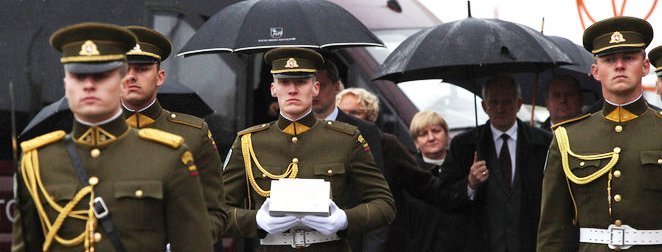O P I N I O N
by Pinchos Fridberg
2013 m. vasario mėn. 5 dienos darbo pabaigoje į Lietuvos žydų bendruomenę buvo atsiųstas el. laiškas
2013 m. vasario mėn. 5 dienos darbo pabaigoje į Lietuvos žydų bendruomenę buvo atsiųstas el. laiškas
The following is a translation of the 10 February blog of Artūras Račas, editor-in-chief of Baltic News Service (BNS). Only embedded links (marked by underlining) have been added, along with editorial editions enclosed in square brackets [ ], enabling readers to better follow Mr. Račas’s attacks on Holocaust survivor Professor Pinchos Fridberg and Holocaust historian Dr. Efraim Zuroff, director of the Simon Wiesenthal Center Israel office.
Westerners looking at the political landscape of Lithuania should not be duped into thinking, as has been stated on this site before, that those sitting on a board for Jewish cemeteries are necessarily in it for their dedication to the Litvak heritage, or, as I am about to illustrate here, that those sitting in committees for defending equal rights are necessarily in favor of universal equal rights.
The question we need to examine is why someone opposed to equal rights would aim to become a spokesperson of those same rights. Membership of such a committee or board can in fact be a good opportunity to hijack a concept in order to hide certain failures and shortcomings and to tailor its meaning to fit certain political goals. This is what in my opinion is happening in the appointment of Leonard Talmont as Chair and Mantas Adomėnas as Deputy Chair of the Parliamentary Committee on Human Rights.
Artūras Račas, head of Baltic News Service (BNS), the main news agency in the Baltics, in a tweet today heaped scorn on Vilnius Holocaust survivor Professor Pinchos Fridberg and on the director of the Simon Wiesenthal Center’s Israel office, Dr. Efraim Zuroff. The tweet is reproduced below and links to the tweeter’s article, which is also available in English translation [updates: Prof. Fridberg’s reply; later report].
As readers of Defending History are aware, many American citizens and others who care deeply about the memory of the Holocaust being accurately transmitted have been devastated by the shift in US State Department policy toward appeasement of far-right Baltic revisionism, apparently in the context of various geopolitical issues. The topic is the focus of a section of DH.
BACKGROUND READING
Vilnius native and life-long resident Professor Pinchos Fridberg sent the following question to the leadership of the Jewish Community of Lithuania (JCL), and received the following answer. These official English translations, accepted by JCL, are reprinted verbatim, with permission from the website of the Jewish Community of Lithuania, where the question appears here and the reply here.
I’ve never met Christine Beresniova, but I’ve followed her career, so to speak, through the media and mutual acquaintances, and wish her only the best. She first came to my attention after apparently making some very limited and not very public criticisms of Lithuanian Holocaust education, which sufficiently pissed off the Holocaust Obfuscation establishment ensconced within the corridors of state power for them to label her some kind of Russian agent in informal conversations.

LGBT Equality (the LGL — Lithuanian Gay League) today issued a statement on its website urging the Vilnius municipality to change its heart over a decision to ban the Baltic Pride march from the capital’s center in the summer of 2013, just as Lithuania will proudly be assuming the rotating chairmanship of the European Union. The statement follows an earlier 16 January statement.
In the meantime, a nationalist website has announced that the March 11th 2013 neo-Nazi march will proceed on the capital’s central boulevard as always, irrespective of any requests from the municipality. The statement is signed by a former long-term high official of the Genocide Research Center who was involved in organizing various neo-Nazi marches and defending them publicly.Continue reading
The blog Christine Beresniova and Rokas Beresniovas recently published the article “A lamentable absence of sexy scandals.” We will refrain from comment on their understanding of the concept “sexy scandals” and stick to the work of fellow human rights advocates, which entails standing up to powerful establishments on behalf of minorities, victims of prejudice, and in the case of Eastern Europe, the victims (and handful of survivors) of genocide. Those who stand up know all too well that to do so is not all that often convenient, easygoing or self-serving.
An important new paper by Dr. Per Anders Rudling of Lund University, Sweden, has appeared in the new volume, Analysing Fascist Discourse: European Fascism in Talk and Text. The collective volume brought out by Routledge (New York & London) is edited by Ruth Wodak and John E. Richardson.
Dr. Rudling’s paper, entitled “The Return of the Ukrainian Far Right: The Case of VO Svoboda” comprises the sections:
The small courtroom in the building of the Lithuanian Supreme Court a few yards away from the nation’s Seimas, or parliament, was packed with journalists and mostly older generation nationalist opponents of Algirdas Paleckis. Two judges, speaking in different sections, upheld the earlier verdict against him for having proposed a version of events for January 13th 1991 that is at odds with national historiography.
The Lithuanian government sponsored “International Commission for the Evaluation of the Crimes of the Nazi and Soviet Occupational Regimes of Lithuania,” known for short as the “Red-Brown Commission” has recently added a new layer of obfuscation and opacity to its activities.
Its website has deleted the names of the “Members of the Commission” thereby rendering it a kind of “secret society.”
LGBT Equality (the LGL — Lithuanian Gay League) today issued a statement on its website concerning the progress of the application to the Vilnius municipality to hold the Baltic Pride 2013 March for Equality on Gedimino Boulevard, the capital’s central avenue, on 27 July 2013.
In the meantime, the municipality, though it has requested that the neo-Nazi march planned for the nation’s March 11th independence day be moved from Gedimino Boulevard (where it has regularly been held since 2008 with participation of right-wing members of parliament and with few or no objections from Western embassies), seems not to be pursuing that request with any verve.
VILNIUS YEARS GONE BY:
Video of the first (2008) neo-Nazi march in the city center
Eyewitness account of 2010 Baltic Pride March across the river
Eyewitness account of 2011 Neo-Nazi March in the city center
Eyewitness account of 2012 Neo-Nazi March in the city center
Jerusalem—The Simon Wiesenthal Center today praised the steps taken earlier this week by the international football federation (FIFA) to punish the Hungarian Football Federation in the wake of the antisemitic behavior of many dozens of Hungarian fans at a friendly match against Israel held this past August 15 in Budapest.
http://evreiskiy.kiev.ua
http://groups.yahoo.com/group/Jewish_Daily_News/message/92
http://www.facebook.com/evreiskiy.kiev.ua
In the 2012 elections to the Verkhovna Rada the far-right nationalist Svoboda party passed. To date, the Svoboda fraction has 37 parliament members, within the total of 450 parliament members.
